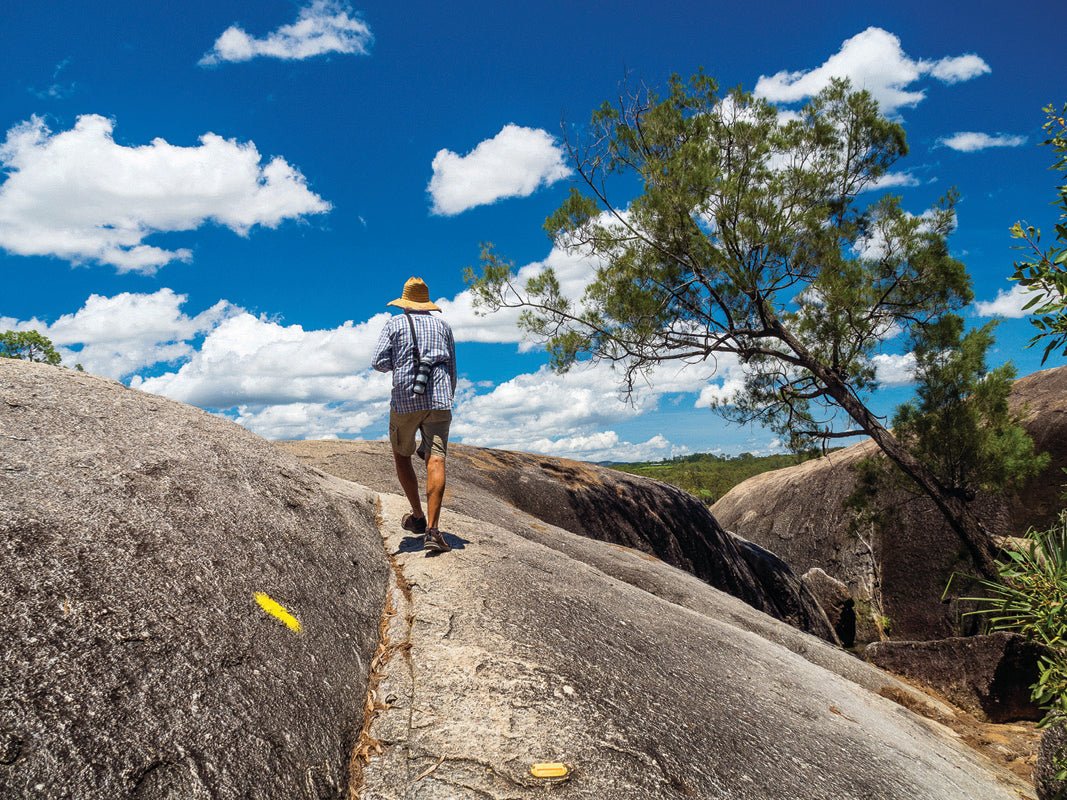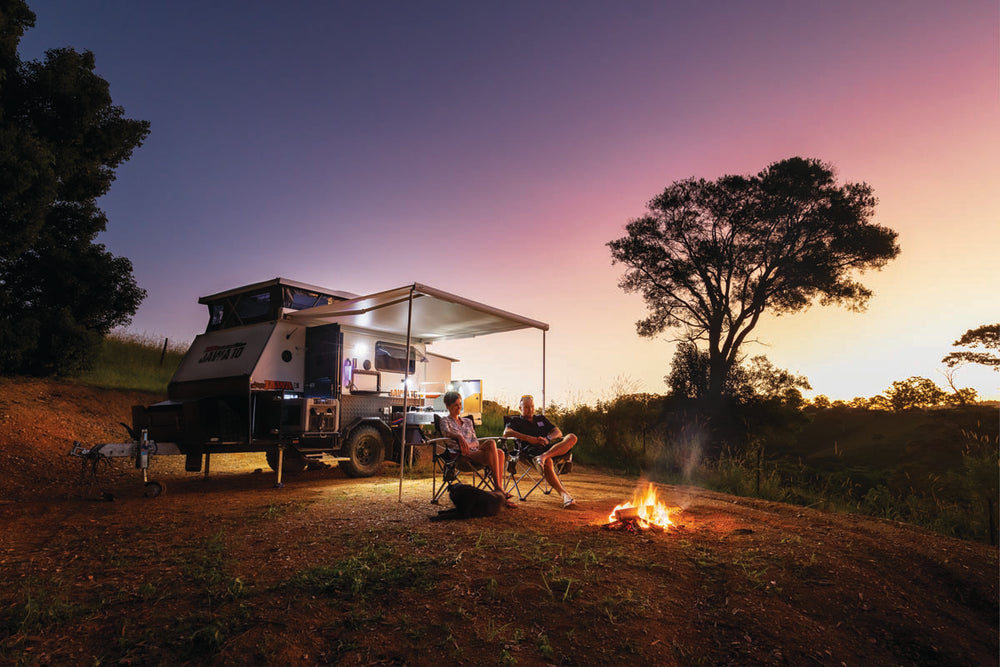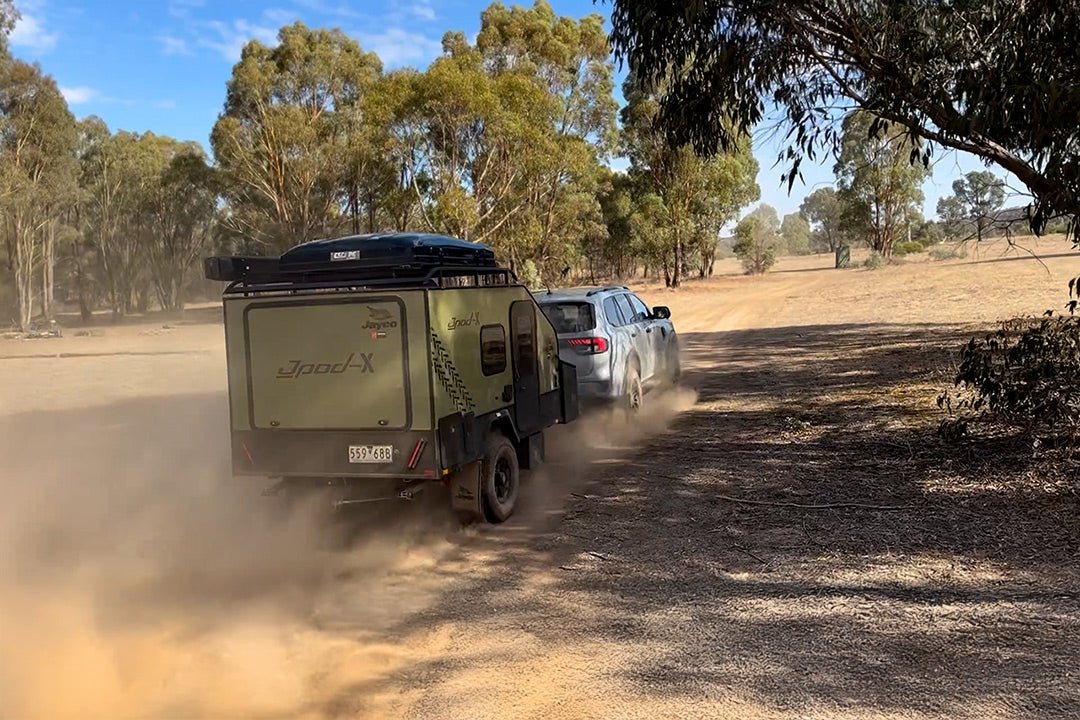Chasing the sun in Mareeba, Far North Queensland

The town of Mareeba in Far North Queensland makes the perfect base to explore the beauty of the bush
It’s sunny for 300 days a year, according to the welcome sign. I’ve been to Mareeba many times, and have to say that I can’t remember ever visiting in the rain. Dark, moody skies on occasion, yes, but rain, no. Of course, limited rainfall makes for dry, arid country, but Mareeba (sometimes bundled into the Atherton Tablelands, depending on who you ask) brims with natural beauty.
Mareeba is particularly popular amongst the caravanning, camping and RV community as a logical stop when passing through Cairns and Kuranda, and exploring the Atherton Tablelands. While the town itself is hardly a buzzing metropolis, the greater region is peppered with waterfalls, swimming holes, hiking trails, coffee plantations and cellar doors.
Going bush
Mareeba sits at the junction of the Barron River, Emerald Creek, and Granite Creek, and means ‘meeting of the waters’ in the local Indigenous language. Upon European settlement, it was known as Granite Creek. The town name didn’t stick, but the striking landscape of mottled, grey granite (unsurprisingly) remains.
One of the top places to appreciate the region’s hallmark geology, and one of my favourite places to visit in the area, is Granite Gorge for its titan boulders, sweeping vistas and adorable rock wallabies (they’re not shy). The nature park sits on private land, so there’s a $13 entry fee to visit, but if you hire a campsite, you can hike, picnic and swim as you please.
The best way to appreciate the park is to clamber across the smooth boulders, and there are two marked trails — yellow (short and easy) and red (long and hard) — though, you can certainly do both back-to-back, as the ‘long’ trail only takes around 90 minutes. The red track also requires some agility — this is ‘bouldering’, but not the indoor climb-up-a-wall kind.
Clambering up and down amongst rocks and the occasional creek rapid, you feel a million miles from anything, but when you pop out the end and loop back to the start along the emergency access track through the bush (unless you fancy backtracking, but I didn’t), you realise the crow-flying distance isn’t that far. And if you then take the easy trail, you can jump in the shallow water next to the weir for a dip.
Keep in mind that the boulders get hot during summer, and if you opt for the longer trail, you will be using your hands (and maybe even your backside) at times. A pair of gloves wouldn’t go astray, or you can follow the cue of the far more sensible wallabies, and not go jumping around on big rocks in the middle of a January day.
Though the furry brown rock wallabies tend to lay low in the heat, you’ll still often see them lounging under trees near the reception area. If there’s any whiff of food, however, their little noses will start to twitch, and they’ll head towards the source. It’s best not to feed them, but, if you insist, the reception sells pellets. With that, the wallabies know that any passer-by has snack potential, so at least one is bound to hop to your feet, looking up with long-lashed wallaby eyes.
Cool waters
While lazing about in the shade is one way to keep cool on a hot day, the Mareeba area also has some spectacular natural swimming pools, and Davies Creek is up there with the best. Here, gushing water cascades down the mountainside over huge granite boulders, forming a series of stepped rock pools. Even when it’s busy, you can likely find your own pool to relax in, perhaps even propping yourself up against gentle rapids to enjoy a free spa while looking across the open eucalypt woodland. There’s generally enough shade and smooth rock to find a nice picnic spot too, or you can do as the locals do and come equipped with a shade cloth, tables and chairs (just leave the caravan behind). If you’re into mountain biking, there are a number bike trails in the area.
Emerald Creek Falls is another favourite swimming spot with the locals, though it takes a little more effort to get to. The falls can be found at the end of a rough corrugated dirt road — not so rough that a 2WD can’t get through, but too rough for a caravan. Like Davies Creek, the water rushes over and between huge rocks through the bushland, and a splay of white water creates a wide waterfall that’s best viewed from the lookout. Though the sign says the lookout walk takes an hour, 15 minutes up and 15 back should do it if you have reasonable fitness. The swimming area is marked by big painted arrows on the rocks, as the main pool can be tricky to find amongst the huge rocks that stack along the creek rapids. There are some slippery surfaces along the way, but rewarding views greet you when you get there.
On balance, Davies Creek Falls is more accessible and has more places to swim, but if you’ve got time, do them both.
Local tastes and tipples
In its early days, Mareeba served as a stop for gold miners heading inland to make their fortunes, and later it became one of Australia’s largest tobacco farming areas. With the demise of tobacco, the region transitioned to grow many other crops, and trees heavy with avocados, mangoes, coffee fruit and bananas now line the roadsides.
Though smokes are out for the Mareeba region, fancy booze is in, and it often has a distinctive FNQ flavour. At de Brueys Boutique Wines, grapes are traded for locally grown lychees, passionfruit and mangoes to make table wine, and the flagship fortified is a coffee elixir, made using beans from the nearby Jaques coffee farm. At the sandstone cellar door set amongst quiet bushland, you can also try wines made using unusual tropical fruits like jaboticaba and bush cherries. The best way to see if these out-of-the-box creations are to your liking is to do a tasting with the resident manager, John, who will talk you through the flavour profiles, and if that doesn’t win you over, John’s assistant Ken probably will — the gentle black farm dog that will flop at your feet for a belly rub.
If you’re intrigued by the idea of mango wine, you can try a variety of wine styles (dry, sweet, sparkling, fortified) using juicy FNQ fruit at Golden Drop Winery on the northern side of Mareeba at Biboohra. This family-run business pioneered mango wine in the late 1990s and has been going strong ever since.
The cellar door isn’t anything fancy, but it’s set right amongst the action. A visit will see you driving through one of Australia’s largest mango plantations (17,500 trees) until you reach the packing shed, where the cellar door shares space with workers sorting and packing thousands of blushing Australian Kensington red mangoes.
Mango trees are replaced by a jungle of shaggy banana trees in Walkamin on the other side of Mareeba, and nestled amongst them is another FNQ jewel — Mt Uncle Distillery. Founder and head distiller Mark Watkins’ interest in spirits goes back to his teenage years when he developed a primitive still at the back of his parents’ banana farm (and nearly burnt the farm down in the process). He’s since proven his salt by taking out numerous titles, including the ‘world's best pot still rum, five-years-old and under’ at the World Rum Awards for his Iridium rum (I’m not usually a rum drinker, but this silky drop sits front and centre in my spirits collection) and ‘gin of the year, best in show by country’ at the London Spirits Competition for his botanic Australis navy strength gin. The rum is made using sugar cane sourced from a farm down the road, and many of the gin botanicals can be seen growing out the front of the cellar door.
Another local business getting creative with their farm produce is Skybury. Owned by the MacLaughlin family since its establishment in 1987, Skybury is one of Australia’s largest coffee producers, with 90,000 trees set across 400 acres. Coffee trees are interspersed with rows of papaya trees to shade the coffee cherries from FNQ’s harsh heat, and papaya has become another signature Skybury product, along with lime, following the family’s recent acquisition of a neighbouring farm. Coffee, papaya and lime feature heavily on their cafe menu — chicken korma with subtly sweet papaya, a cuban sandwich with papaya pickle, a double-espresso milkshake, and a refreshing lime spritzer are some of the menu items. Once again, scenery is at its premium, so all of this can be enjoyed from the deck of a huge timber pole house, overlooking the farm and surrounding bushland. There’s also a complimentary tasting area where you can sample Skybury’s latest venture — papaya vodka and schnapps, and espresso liqueur — and a small theatre room loops a video about the coffee harvesting process.
Back in town, the Mareeba Coffee Works is one of the locals’ favourite meeting places. Now a busy cafe, chocolaterie, roastery and gift store, the family business got its start at Rusty’s market in Cairns in 1988 and have since expanded into nearby towns and supply many cafes. If you keep your eyes peeled as you travel across Far North Queensland, you’ll likely spot plenty of products from the Mareeba and Atherton Tablelands area, as the businesses know their fellow locals are onto a good thing. And if you’re touring the area, you can get right in amongst the action, with a healthy side of Vitamin D, of course.
Fast facts
Stay
- Caravan parks are a dime a dozen in the Mareeba area. Some options include:
- Ringers Rest RV Park: Set on a 360-acre property and accessed via a sealed road that runs past de Brueys Boutique Wines: ringersrest.weebly.com/rv-park.html.
- Granite Gorge Caravan Park: A pretty, shaded camping area located within the nature park: granitegorge.com.au.
- Walkamin Caravan Park: A convenient base next to the main road, 5km from Mt Uncle Distillery: walkamincaravanpark.com.au.
- Tropical Travellers Park Mareeba: A multi-use area with studio apartments and caravan sites, positioned right on the Kennedy Highway: tropicaltravellerspark.com.au.
Learn more
There’s a small heritage museum at the Mareeba visitor information centre, with free entry: mareebaheritagecentre.com.au.
Good to know
More than 300 species of birds can be found in the Mareeba area. You might spot red-tailed black cockatoos, jabiru, blue-winged kookaburras and magpie geese.







